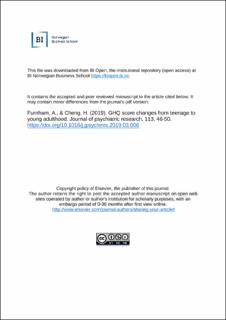GHQ score changes from teenage to young adulthood
Journal article, Peer reviewed
Accepted version
Permanent lenke
https://hdl.handle.net/11250/2724061Utgivelsesdato
2019Metadata
Vis full innførselSamlinger
- Scientific articles [2181]
Sammendrag
This study investigated the change in the General Health Questionnaire (GHQ-12) scores from teenage years to young adulthood using a large, nationally representative sample in the UK. It took account of socio-demographic variables, childhood intelligence, behavioural problems and self-esteem at teenage and educational qualifications in early adulthood. In total, 3942 cohort members had the complete data on GHQ at ages 16 and 30 years. T-tests showed that there was statistically significant increase of GHQ mean scores over the 14 years (p < .001), however at the item level there were changes in both directions. The analysis showed that over 14 years the test-retest correlation was r = 0.24, indicating a modest level of stability. The GHQ was significantly and negatively associated with self-esteem, and positively associated with childhood behavioural problems. Regression analysis showed that gender, self-esteem, and behavioural problems measured in the teenage years were all significant predictors of GHQ at both time points, indicating the long-term effects of psychological and behavioural factors on teenagers and young adults’ mental health outcome. The implications for early interventions in school and family settings are discussed.

